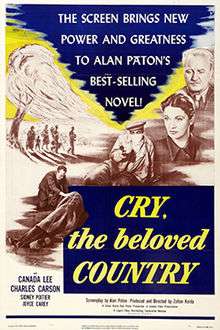Cry, the Beloved Country (1951 film)
Cry, the Beloved Country is a 1951 British drama film directed by Zoltán Korda. Based on the novel of the same name by Alan Paton, it stars Canada Lee, Sidney Poitier, and Charles Carson. This film was Canada Lee's last film.
| Cry, the Beloved Country | |
|---|---|
 U.S. theatrical release poster | |
| Directed by | Zoltán Korda |
| Produced by | Zoltan Korda Alan Paton |
| Written by | Alan Paton (novel & screenplay) John Howard Lawson (screenplay) originally uncredited |
| Starring | |
| Music by | Raymond Gallois-Montbrun |
| Cinematography | Robert Krasker |
| Edited by | David Eady |
Production company | |
| Distributed by | British Lion Films (UK) Lopert Pictures through United Artists (US) |
Release date | 23 January 1952 (US) 25 April 1952 (UK) |
Running time | 103 minutes |
| Country | United Kingdom |
| Language | English |
| Box office | £95,433 (UK)[1] |
Although not a solely black cast the film is a rarity for its date in that all the main characters are black, and the white roles are as supporting actors. However, the contemporary film posters chose to illustrate only the white supporting actors.
Plot
From the back country of South Africa, black minister Stephen Kumalo (Canada Lee) journeys to Johannesburg to help his sister, who has been reported to be ill, and to search for his son, who left home and has not kept in contact. He is also asked to visit the daughter of someone who has not heard from her for some time. With the help of fellow minister, Reverend Msimangu (Sidney Poitier), he discovers that his sister, who has a young son, who left home to find her husband who left in search of work, failed to find him and has been in prison and is a prostitute. He finds out that his son has got a young girl pregnant and is a thief and murderer. Both live in a poverty stricken urban community. The ministers confront the harsh reality of apartheid and its inimical effects on both white and black inhabitants.
Cast
Cast and characters are in order as listed by the British Film Institute.[2]
- Canada Lee as Stephen Kumalo
- Sidney Poitier as Reverend Msimangu
- Charles Carson as James Jarvis
- Joyce Carey as Mrs. Jarvis
- Geoffrey Keen as Father Vincent
- Michael Goodliffe as Martens
- Edric Connor as John Kumalo
- Lionel Ngakane as Absolom
- Vivien Clinton as Mary
- Albertina Temba as Mrs. Kumalo
- Charles McRae as Kumalo's friend
- Ribbon Dhlamini as Gertrude Kumalo
Production
Zoltan Korda's acclaimed smash film was shot entirely in South Africa. Since the country was ruled by strict apartheid (enforced racial separation) laws, stars Sidney Poitier and Canada Lee and producer/director Korda cooked up a scheme where they told the South African immigration authorities that Poitier and Lee were not actors but were Korda's indentured servants; otherwise, the two black actors and the white director could have been arrested, and jailed without trial. It marked the first time a major film was shot in the racially divided country, leading to serious exposure of the terrible conditions there. After the making of this film, Canada Lee planned to make a full report about life in South Africa: he was then called to appear before the House Un-American Activities Committee to explain his actions, but died of heart failure before he could testify.
Critical response
The film was well received by critics, and currently holds an 89% rating on Rotten Tomatoes.[3] Those praising the film included Bosley Crowther in The New York Times who stated "It is difficult to do proper justice to the fine qualities of this film or to the courage and skill of Mr. Korda in transmitting such a difficult and sobering theme."[4]
Awards
- Won
- 2nd Berlin International Film Festival - Bronze Berlin Bear[5]
- Nominated
References
- Vincent Porter, 'The Robert Clark Account', Historical Journal of Film, Radio and Television, Vol 20 No 4, 2000 p498
- "Cry, The Beloved Country". BFI Film & TV Database. British Film Institute. Retrieved 22 February 2016.
- "Cry, the Beloved Country". Rotten Tomatoes.
- Crowther, Bosley. "THE SCREEN IN REVIEW; Alan Paton's 'Cry, the Beloved Country,' With Canada Lee, Opens at Bijou Theatre". The New York Times.
- "2nd Berlin International Film Festival: Prize Winners". berlinale.de. Retrieved 22 December 2009.
- "Festival de Cannes: Cry, the Beloved Country". festival-cannes.com. Retrieved 17 January 2009.